#-character in the entire show who has committed almost every felony ever. and he's the main character.
Explore tagged Tumblr posts
Text
if asshole characters like Jax are making certain TADC fans this pissed off i fear that they wouldn't survive watching just 5 minutes of Dan Vs
#dan mandel is the culmination of every crime and destructive bad behaviour ever they would NOT survive him for a second#this post is a certified /hj#half joking as in heeheehaha they can't handle mean characters but also. they really can't handle mean characters....#i think this discourse is just so interesting as a dan vs fan which literally has a character who is objectively the most morally corrupt-#-character in the entire show who has committed almost every felony ever. and he's the main character.#i feel like jax and dan would be besties if they ever met#like they'd hate each other at first but then quickly bond over their love for destruction and death and chaos#dan vs jax who wins#also again this is not a post against tadc fans. i am a tadc fan myself. i just think ''jax being mean is BAD!!!!'' is a pretty silly idea#tadc#jax#dan vs#fandom discourse
23 notes
·
View notes
Text
OTP PROFILE GAME!
rules: answer the questions about your favorite ship (all time or current) then tag 10 people to do it too!
tagged by @chloexmorningstar (ily Sho!!!) and listen... obviously newtina is my #1 ship ever. i am doing peggysous, even though it’s a lowly #4, because reasons. and apologies to everyone for how goddamn long this got. i have a lot of feelings about these two.
SHIP AND FANDOM: peggysous/agent carter
MOMENTS:
what were their first impressions of each other?
sadly we don’t get the peggysous meet-cute- in fact, i’m just realizing now that most of my favorite ships meet offscreen, which is kind of weird. we do know that they’re each other’s only friend in the workplace, and even more than that they’re on first-name basis, so i like to think that when they met, they both kind of went wow, this one sucks a lot less than every other person that works here!, and then the rest was history.
a moment you think that both/one of them will remember forever about each other:
i mean obviously the rebar incident, but also when peggy had to choose between the literal universe and daniel and chose daniel. everything worked out and the universe was fine, but the fact that peggy “dispassionate, chief, your words” carter even took that chance speaks volumes about how much she loves him, and i think it’s something they’ll both remember for a long time.
a moment you think that both/one of them wishes hadn’t happened:
when i saw this i instantly went, “well obviously peggy’s interrogation was not a high point for them,” and then remembered that peggy asked daniel for a rain check when he asked her out and he took that to mean “i don’t want to see you again ever” and literally moved across the country, so i’d say there were a couple of rough patches lol. conversely, i think that peggy in retrospect is extremely glad she got impaled by that rebar because otherwise they would have just stayed in pining hell forever.
what is their moment for you?
if i'm not allowed to choose “literally all of season 2,” i’m going to say when peggy kidnaps rufus hunt and daniel gets angry not because she committed a felony, but because she committed a felony without him. daniel is a lot more by-the-book than almost every other character on the show, so the fact that that’s the thing he’s mad about really shows how much he’s come to trust and care for peggy. as they both say, they’re a team now.
LIFE QUESTIONS:
marriage? if yes, who proposes?
yep! they get married. avengers endgame never happened. aos will never happen. i’m not sure if i like the idea of peggy or daniel actually proposing better, but daniel definitely buys the ring and agonizes over how to make the perfect proposal, and then of course they actually get engaged on a whim during some messy, high-stakes action sequence.
children? if yes, if one had to stay home with them, who would do it?
we know that peggy and whoever she canonically marries do have two kids, so assuming it’s daniel (which it is), there are definitely kids! neither of them stay home- they’re good parents but obviously very busy at work, especially peggy- but they spend as much time with them as they can, and the jarvises are more than happy to look after the kids when they can’t.
housing? where do they live together?
i have absolutely no idea where the original base of shield was, and i don’t think the ac one-shot is actually canon, so let’s say for argument’s sake, and for the sake of “most of the characters i headcanon as being involved with shield’s creation were located in california in the late 40s anyway,” and for the sake of “as of 1995 there was still a prominent shield base located in l.a.,” that it was near los angeles. in which case i guess peggy could just move in wherever daniel’s living. it looked like a nice enough place.
pets? do they get a pet together?
i don’t see them as pet people, honestly. i think bernard has put them off that idea.
PERSON A&B…
who would kill/remove the spider and who would leave it under a cup and leave the room?
peggy is definitely terrified of spiders just because i think the “peggy carter, the same woman who fought in the war and took down dottie underwood and punched me in the nose, is afraid of spiders?” “shut up, jack!” conversation would be hilarious. this leaves daniel as the de facto getter-ridder of spiders.
who sings all day long and who gets so used to it they don’t even hear it anymore?
this is not something i'd ever pictured either of them doing; however, i’m absolutely loving the idea of serious, professional daniel singing under his breath while working on case files. peggy thinks this is the cutest thing in the world but figured out very early on that if she comments on it, he stops, so now she just lets it happen without a word.
who can cook a gourmet meal for two and who can maybe use the toaster?
peggy obviously can’t cook to save her life. i think the entire fandom has accepted this as fact. daniel i can see as a decent cook, but i think if for whatever reason they actually need to provide food for anyone other than themselves, peggy calls jarvis in a panic and makes him do it.
who wakes up before the sun rises and who would sleep in until 2pm if they didn’t have an alarm?
neither of them really strike me as early risers (or late risers- they seem to have a reasonable sleep schedule when they aren’t up to spy shenanigans), but peggy definitely gets up before daniel.
who is more affectionate/touchy?
in public i think they’re both usually very professional or at least not blatantly affectionate, but in private or with friends they cannot keep their hands off each other. peggy is usually the worse offender but it’s oftentimes a toss-up. they drive jack crazy.
who wears the other’s hoodies/shirts?
look i don’t think this is something they’d do, but i’m definitely giggling at the thought of peggy walking around in a fucking hawaiian shirt that’s about two sizes too big for her.
who said “I love you” first?
i like to think that a very exhausted peggy, after daniel did something like bring her coffee when she was working on case files at one in the morning, groaned “daniel sousa, i bloody love you” without really thinking about it and then promptly became so re-engrossed with the files that she nearly missed daniel’s quiet “...love you too, peg.”
tagging @erumpets @florenepugh @wespers @mollyweasly @nataliarvmanova @romanocff @saralahnce @captleia @billhaders @wintersoeldiers and anyone else who wants to do it :)
#YIKES this got long#tag game#about me#marvel#agent carter#peggy carter#daniel sousa#peggysous#ac spoilers for maya
54 notes
·
View notes
Text
Better Call Saul Rewatch, Part 1/30: They Called Him Slippin’ Jimmy
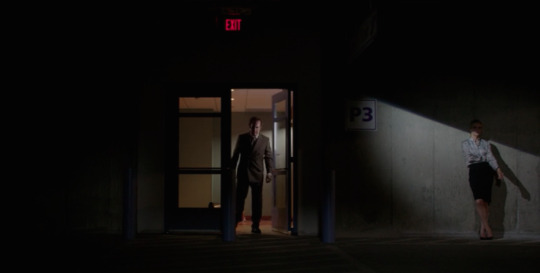
Late last month, I decided to rewatch all of BCS and post about it, one episode at a time, every day during the 30 days leading up to the premiere. The elements of this plan that proved problematic were “post” and “one episode at a time”, but we’ve still got three weeks, so let’s do this. I’m not much of a critic; this is going to be mostly just a bundle of thoughts and observations. There will also be a key to references in the dialogue, notes on locations and the timeline, and probably a lot of gushing over beautiful frames, because there are many (see above! look at that! look at it!!!). The tag will be #bcs rewatch, for your following/blocking needs.
Uno (Season 1, Episode 1)
Written by Vince Gilligan & Peter Gould / Directed by Vince Gilligan
If the Cinnabon sequence constitutes fanservice, I don’t care, because it’s brilliant.
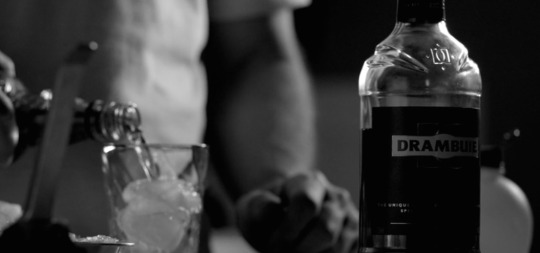
BCS uses a lot of intense chiaroscuro, and it starts in the scene at Gene’s apartment. Details— the ice in the glass, the white label on the bottle of Scotch— are highlighted, the rest of the picture is subdued. There’s also a gorgeous softness to the black-and-white images. Overheard on the TV as Gene pours: a woman cheerily saying “Well, from time to time, people make mistakes, that’s okay!”
There’s a bit of Breaking Bad-style handheld camera here, which stands out because it’s mostly absent from the rest of the show. In Gene’s living room we have the first appearance of glass block windows, about which blogger Marc Valdez wrote an excellent piece (Streamline Moderne and Jimmy McGill).
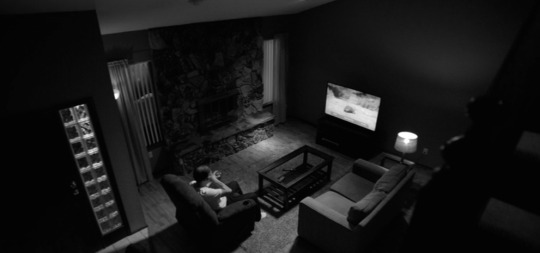
“No charge is too big for me!” says Saul, on the tape that Gene is watching in hiding with his blinds closed. :(
(In this episode, Jimmy’s personae are introduced in reverse chronological order: first Gene, then Saul Goodman, then James M. McGill Esquire, then Slippin’ Jimmy.)
It’s May 13, 2002, and the courtroom scene— beautifully paced, by the way— is one of the most distinctly Vince Gilligan scenes that ever Vince Gilliganed. The stenographer loudly slurping on her Big Gulp, the attorney using her legal pad to draw a shirtless man on a unicorn, the prosecutor silently wheeling in the TV in response to Jimmy’s argument, and most of all, the horrifying punchline.
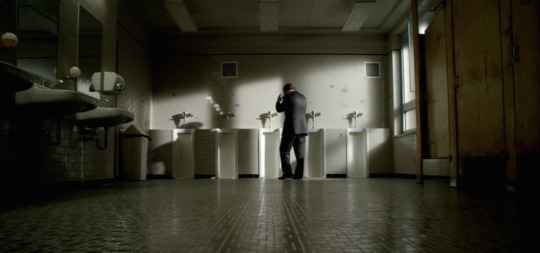
When we first encounter Jimmy— as opposed to Gene or Saul— he’s pacing in the men’s room, muttering about how people shouldn’t be punished for whatever stupid things they did when they were young. Hmm. The three defendants sit there, chastened and nervous in ill-fitting ties, as Jimmy does an excellent job of talking around what it is they actually did. No one got hurt! It wasn’t trespassing, the business was open day and night! “I don’t think they deserve to have their bright futures ruined by a momentary, minute, never-to-be-repeated lapse in judgment,” he tells the jury.
I’m jumping ahead here, but where do you think Jimmy would have ended up if the whole Chicago sunroof incident never happened? I mean, he wouldn’t have gone to Albuquerque, he wouldn’t have become a lawyer… do you think he was happy just running small-time cons and smoking weed at age c. 30?
Anyway, as soon as we see the boys in the mortuary, let alone hear the sawing, we know the case is unwinnable. Jimmy collects his meagre paycheck and stalks out to his car. The show teases us a bit by putting a white pearlescent Cadillac front and centre in the frame before panning across to a battered 1998 Suzuki Esteem (aside: that car is awfully beat up for being only four years old). I love the car, by the way. The colour and the mismatched door are perfect.
The Kettlemans, who could have stepped straight out of an episode of Fargo (as Julie Ann Emery in fact did!), introduce the theme of denial of reality. They’re the innocent victims of a misunderstanding, you see. Craig’s business practices are “beyond reproach”. The missing money is a “discrepancy”. While Craig is amenable to hiring Jimmy, Betsy won’t have it; needing a lawyer would imply guilt, after all. Bob Odenkirk plays Jimmy’s barely-hidden desperation very well. He looks literally and figuratively hungry as Craig prepares to sign.
I want to take a moment to comment on Dave Porter’s score, which helps set Better Call Saul apart from Breaking Bad. The two scores are similar enough to provide continuity, but where Breaking Bad’s music is full of mechanical sounds, drones, saws and reverberations, the music of Better Call Saul has a much warmer timbre, more traditional instrumentation and a more naturalistic sound. (The best side-by-side comparison I can think of is “Dead Freight” versus “Border Crossing”— similar themes, similar rhythm and tempo, completely different feels.) The use of flute and harp stands out in particular— you’d never hear those instruments used in the same way in an episode of Breaking Bad.
One of this episode’s most effective individual beats is Cal coming out of nowhere and hitting Jimmy’s windshield, which manages to be startling even when you know it’s coming. It’s the distraction factor: preoccupy the audience with new information (Jimmy’s card was declined) and then fling a skateboarder into the frame. Jimmy, his windshield broken (can we call that a Breaking Bad reference?), limps home.
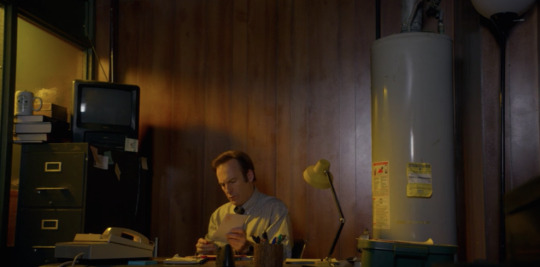
The lighting in Jimmy’s office is just gorgeous. This show unreasonably romanticises broke lawyers living in salon backrooms. We learn that Jimmy has a host of “past due” bills— wireless, Visa, library, Diner’s Club, phone— and then get a brilliant hook in the form of a check for $26,000 (dated May 9, 2002, for those of us tracking this stuff) that he promptly rips up, scowling.
Everything about the offices of Hamlin, Hamlin & McGill is so composed, right down to the five-note elevator chime. Blue and wood panelling predominate. I’ll have more to say about colours later on.
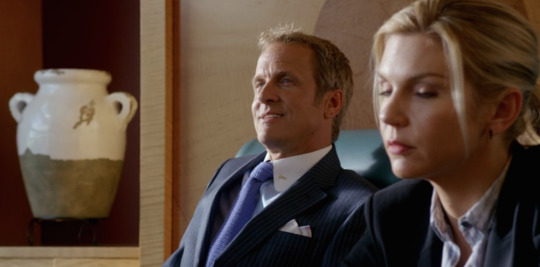
The boardroom scene is a beautiful piece of exposition, establishing characters and relationships bit by bit without spelling anything out. Chuck is someone close to Jimmy, and Hamlin, a senior partner at HHM, is giving Chuck money. He’s paying it into Jimmy’s account because Chuck isn’t capable of going to the bank, for some reason. Chuck helped build the firm, but he doesn’t work there any more and Jimmy thinks he never will again. Hamlin, on the other hand, believes Chuck can overcome his situation, and Jimmy dodges the question when asked whether Chuck really wants to be cashed out. The words “brother” and “illness” aren’t even used.
“If Chuck can call this an extended sabbatical, so can we”, Hamlin says— it’s not just Betsy Kettleman who’s engaging in a degree of denial (though the whole situation with Hamlin and Chuck’s illness becomes much more shaded and more complicated later on).
Let’s take another look at this incredible frame:
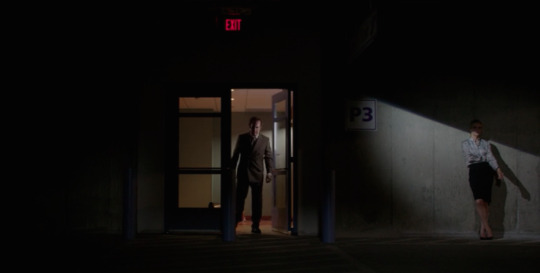
Kim and Jimmy share a cigarette. Seven words are spoken. Thus, their relationship is sketched out. See above re: exposition. We also see Kim literally clearing up after Jimmy after he takes his frustration out on the trash can, illustrating how they respectively deal with unfairness; he lashes out, she sets things straight.
Again in darkness, Jimmy arrives at Chuck’s house, stashes his phone and keys in the mailbox, and grounds himself on a piece of metal. (The air in Albuquerque is so dry that it’s very easy to build up a static charge. I was constantly getting zapped by door handles.) Chuck, noticing Jimmy’s discontent, instinctively asks him if he’s “in trouble”, which must sting.
Good Lord the lighting is beautiful.
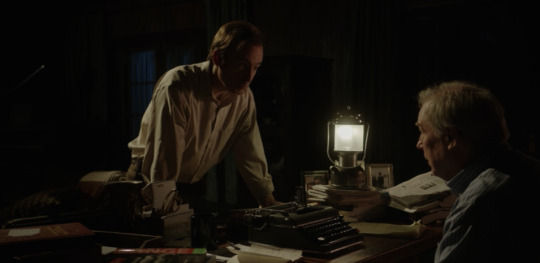
Chuck does have a point about what would happen if he were to cash out of HHM. Jimmy doesn’t seem to see past the initial payout. What they’re really arguing about, beyond money, is whether or not Chuck is ever going to recover from his unspecified illness. The way his voice breaks on “I’m going to get better!” is rough.
“Your friend Kim— a promising career, over and done with.” Not to read too much into this phrasing, but it sounds almost like Chuck thinks that if Kim lost her job at HHM it would be the end of her entire career. As if the firm is only keeping her there out of charity.
“But Jimmy, wouldn’t you rather build your own identity?” Oh, Chuck, if you only knew.
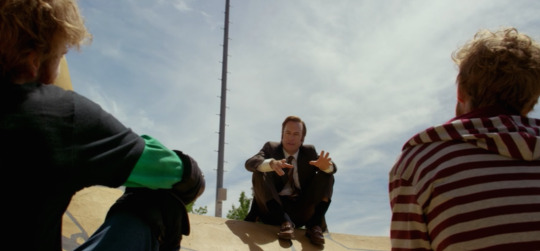
The next scene plunges us into sunlight. Jimmy has tracked down the skateboarders and we get a foundational piece of his backstory: he used to make money running slip-and-fall scams on the icy sidewalks of his hometown, and now he wants the boys to take a hit from Betsy Kettleman so that he can parachute into her good graces. Jimmy, apparently, has been observing Betsy closely enough that he knows where her kids go to school, what time she leaves to pick them up, and what route she takes. I mean, okay.
The hit-and-run happens at 7th Street and Tijeras Avenue, very close to the school where Jimmy & crew film the flag in season 2, and a short distance west of the courthouse district and the Civic Plaza. This whole sequence is such a glorious comedy of errors, and it showcases perfectly Jimmy’s ability to think on his feet. I mean, it’s also true that if he’d aborted the plan when “Betsy Kettleman” had driven off, he never would have ended up hog-tied in the desert pleading for his life, but those are unknown unknowns, I suppose.
“You felonied my brother!" is possibly one of my favourite lines of the season.
Who among us saw Tuco coming? None. None of us. I gasped. It was very considerate of the show to release the next episode immediately.
Miscellaneous
While most of the addresses shown on screen in BCS are fictionalised, the address shown on Jimmy’s mail—160 Juan Tabo Boulevard NE— is the actual IRL location of the nail salon.
Items in Gene’s shoebox: the videotape, an old Band-Aid container, various photos including one of a man standing in front of a 1940s-style car, and a photo packet from a film lab in Portland, Maine
Broken windshields: 2
New Mexico Statutes violated: 3— § 30-28-2, conspiracy to commit felony fraud (Jimmy, Cal and Lars); § 66-7-202, failing to stop after an accident causing damage to a vehicle (Mrs. Salamanca); § 30-3-2, aggravated assault (Tuco)
Timeframe: May 13 to May 25, 2002 (see next post)
Music
“Address Unknown” by the Ink Spots (1939), during the Cinnabon sequence
“Milestones” by Shook (2014), as the twins attempt to scam Betsy
References
Network: a 1976 film about a news anchor who begins ranting about the state of the world during a broadcast. The character whom Jimmy quotes (”You have meddled with the primal forces of nature...!”) is a man who berates the protagonist for speaking out against his network’s corporate owners. Bryan Cranston starred in the 2017 stage adaptation.
Peter Minuit: a Dutch trader who purchased the island of Manhattan from the Lenape people for a sum equalling about $1,000 in today’s money
“Ergo, a falsis principiis proficisci”: “therefore, you proceed from false principles"
Trichinosis: a parasitic disease most often spread via undercooked pork
Starlight Express: an Andrew Lloyd Webber rock musical performed on rollerskates
> NEXT EPISODE: MIJO
22 notes
·
View notes
Text
Justice for All the J20 Defendants: Why the Police, Prosecutor, Judge, and State Are Guilty
Today, after nearly a year of suspense, the first six J20 defendants to go to trial were declared innocent of all charges. They are only six of over 200 people mass-arrested at Donald Trump’s Inauguration, nearly 200 of whom still face the same identical charges of six felonies and two misdemeanors—a combined threat of decades in prison. The fight is far from over. Indeed, in response to the verdict, the US Attorney’s Office for the District of Columbia announced that “they look forward to the same rigorous review for each defendant.” We must redouble our support for all the other defendants and show that it is the state itself that is guilty.
The fact that the defendants have stuck together up to this point represents a tremendous feat of courage, solidarity, and mutual aid. To be subjected to the whims of the criminal justice system is already to be punished. In this case, that system was used in ways that are unusually egregious: mass-arresting so many people and blanket-charging them with felonies is practically unprecedented, and for months the defendants faced charges that do not even legally exist. This victory shows that Trump and his supporters throughout the legal system have not yet been able to consolidate their progress towards making that system even more oppressive than it was. But we should not conclude that any part of the legal system is ever capable of delivering justice.
The criminal justice system exists chiefly for the sake of intimidating and persecuting dissidents and targeted communities. It could go on doing that effectively even if no judge or jury ever reached a verdict of “guilty” again. Think of the over 1000 people murdered every year by police without standing trial; the tens of thousands who languish in jail for years before they go to trial; the millions who are forced to accept unjust plea deals because they cannot obtain proper legal representation; the tens of millions who are routinely harassed by police and other state institutions.
As far as we are concerned, those who stand up to this system are always innocent, whatever means they employ, and those who maintain it are guilty of perpetuating one of the greatest atrocities on the face of the earth. Permit us to make our case.
Let’s review some of the ways that the J20 defendants have already been punished by this groundless prosecution, long before they went to trial.
First, some of the felony charges that the J20 defendants faced did not even exist. On Wednesday, November 1, Judge Leibovitz reduced two of the felony charges that everyone faced to misdemeanors, acknowledging that felony versions of those charges do not even exist on the books. What legitimacy can the criminal justice system hold when defendants are threatened by nonexistent charges for half a year?
Likewise, on Wednesday, December 13, the judge dismissed the charge of inciting a riot for each of the six on trial. Again, the defendants were terrorized for months by charges that the judge knew were not valid.
Since the beginning, the prosecutors and the state have flagrantly lied to advance their strategy of judicial persecution. On December 13, attorneys for two defendants filed a motion to dismiss the charges against them based on false testimony that the lead detective on the case presented to the grand jury that indicted the defendants. According to the grand jury testimony obtained by the attorneys, the detective told the grand jury that everyone who was kettled and arrested “participated in the entire march,” which the detective, after reviewing hundreds of hours of video footage, clearly knew was false: the two defendants whose attorneys filed this motion only participated in the last three blocks of the march, not the sixteen blocks the detective claimed.
Over the ten months since their arrest, J20 defendants have been forced to lose their jobs as a result of these groundless charges. Some defendants have not been able to renew their professional licenses. Renewing and applying for licensure includes a review of pending charges—and you risk the possibility that whatever you say in that review will be used against you in trial later on. Most of the defendants have had to put their lives on hold entirely.
One of the defendants who was just declared innocent, an oncology nurse, had to quit her job in order to go to trial. Her boss came to testify as a character witness, but not everyone has such a supportive and understanding boss—bosses tend to identify with the police and the state. What about the patients who should have been receiving care from this nurse, were it not for this groundless prosecution?
The defendants have had to spend thousands of dollars each traveling to DC, often for cancelled hearings. They have had to miss work while incurring additional costs securing housing and other resources in Washington, DC.
Altogether, this adds up to well over the already inflated $100,000 that the government claims was caused in property damage on J20, almost all of which was covered by insurance. Just as the US military inflicted ten times as many civilian casualties on Afghanistan in the war that followed the attacks of September 11, 2001, the US government shows no compunction about making random people pay tenfold for any supposed interruption of imposed law and order.
On the day they were arrested, even before they were taken to jail, J20 defendants were made to wait in the cold for eight hours with no access to food, water, or toilets. The area around them filled up with bottles of urine and even feces. Later, at least one arrestee was unlawfully rectally probed by police. As one reported:
“I felt like they were using molestation and rape as punishment,” Horse said. “They used those tactics to inflict pain and misery on people who are supposed to be innocent until proven guilty.” He added: “It felt like they were trying to break me and the others—break us so that even if the charges didn’t stick, that night would be our punishment.”
During trial, it came out that one arrestee went to the hospital because a police stinger grenade blew up beside her leg. In a situation like this, arrestees cannot even speak freely to doctors about their injuries without fear that what they say will be used to convict them, even fraudulently.
youtube
Police violence during the J20 arrests.
DC police released information about the defendants to far-right trolls who published it, “doxxing” them,” resulting in a flood of online threats to defendants. Although it is not known whether any right-wing attacks have successfully been carried out against J20 defendants yet as a result of this doxxing, the state is responsible for creating conditions in which the defendants have had to live in fear.
Facing decades in prison for ten months—with those who hold the highest political offices in the land calling for the worst possible consequences against you—is stressful to say the least. Such stress and anxiety have had a serious impact on the defendants; some of them have wrestled with suicidal thoughts. While not a DC J20 defendant, Nathan Hose, one of the J20 defendants in New Orleans, took his life in August. The groundless charges that Nathan faced have just been dropped for the surviving defendants in his case.
In this regard, those who press groundless charges are murderers with blood on their hands. They would doubtless welcome more suicides from those who face these charges; it speaks to the deep care that J20 defendants and supporters have shown each other that no one else has committed suicide yet.
All this stress has rippled out to affect countless communities that care about the J20 defendants and about freedom of assembly. Indeed, the chief goal of the J20 prosecution has never been to achieve specific guilty verdicts; it has been to set an ugly new precedent for judicial persecution of all who participate in protest activity. If there are convictions in the J20 trial—or even if there are no more convictions, but there are no serious consequences for the mass arrest and blanket charging—we can be sure that the police will continue to use the same strategy to terrorize other protesters in the future. Imagine if they had used this approach to crack down on Occupy or Black Lives Matter demonstrations!
Some defendants have been prevented from traveling to other countries, trapping them in territory governed by Trump. Long before they came to trial, the charges served to separate people from their families and loved ones and to prevent them from building international ties of solidarity.
The conditions of defendants’ pre-trial non-incarceration include not being arrested in DC again; any additional legal trouble they incur can be used against them in court, even if it also turns out to be groundless. This is another way that the J20 charges have been aimed at sidelining and disabling social movements. Think of all the effort that has gone into support videos, podcast episodes, and fundraising to support the J20 defendants this past year, effort which would otherwise have been focused on anti-fascist activities and proactive attempts to create a better world by providing resources to those in need.

If the defendants in the J20 case—more than 200 people—had not been incapacitated, many more of them would surely have been on the front lines in Charlottesville and elsewhere, preventing the far right from mobilizing to intimidate and murder people of color, Jewish people, undocumented people, and other targeted groups. In this regard, the police, the judge, and the prosecutors have Heather Heyer’s blood on their hands, and the blood of others who have been killed by fascists recently—and many more people who will soon be killed, if the state does not stop targeting anti-fascists. The state always functions to enable fascists to go about their murderous business.
Throughout this entire ordeal, the defendants have had to endure opprobrium from those who are still so ignorant as to misunderstand the state as a beneficial force—who do not realize that to be charged with resisting the ever-increasing encroachments of the state on our freedom is, if anything, an honor.
What would constitute real justice, in this situation? If we understand justice as retribution—poetic justice—the police, prosecutors, the judge, and all the other state officials who are implicated in the past ten months of intimidation would be subjected to the same treatment they have inflicted. The police officers would be rounded up and imprisoned; the detective who lied to the grand jury would have his own life ruined by calumny he was powerless to counteract; the prosecutors would be publicly humiliated and forced to face the possibility of spending the rest of their lives in prison. Donald Trump would walk across the desert on a broken ankle, pursued by helicopters and armed men with dogs, before dying of dehydration, terrified and alone, within miles of hospital facilities—as he has forced others to do in the Sonoran desert simply in hopes of rejoining their families.
Our oppressors should be grateful that we do not believe in retribution. We aspire to transform society from the bottom up, not to mete out supposed justice. If ever we are the ones to determine their fates, we will aspire to forgiveness.
But the first priority has to be to interrupt the harm that they are perpetuating. Support the J20 defendants.

28 notes
·
View notes
Text
A Woman’s Fight Against Dominance
In the novel Future Home of The Living God society is changing based off of the new government that goes by “The Church of the New Constitution”. What happened to separation of church and state? As we know in today's society many branches of the government are controlled by men. According to Drew Desilver, 24% of Congress is women leaving the other 76% to be men. The Church of the New Constitution is assumed to be created to take control of a virus
spreading causing still born babies and fatalities amongst women who give birth. This novel to me didn't portray men to be as aggressive and hostile towards women as some other works do. It was more of men and women being controlling towards pregnant women rather than just women in general. Pregnant women were ripped out of their homes and dragged through the streets where they would be brought to a “hospital” to be “taken care of”. Edrich illustrates the control men have against pregnant women with the scene “The police ignored him and started dragging his wife. She planted her feet in refusal. Her husband was a medium sized man, but suffused with anger and protective belligerence he seemed to grow larger...He grabbed the male officer and tried to wrestle the man down, but the police officer, more agile and trained, quickly flipped the man onto the ground and drew his gun.” (Pg.75 Edrich). When the women are taken away by these officers, they are transferred to a hospital.
Cedar, our main character of Future Home of The Living God, is found in her home pregnant so she is brought to the hospital to receive the “proper care” for her child until born. In the hospital the women are not to leave their beds. They are actually given a medication which makes the drowsy and unable to comprehend reality. Agnes, a character Cedar meets while in the hospital warns “Just wait until you flush your happy pill. Realities a bitch. A heavy bitch. Fuck. I'll be outta here though.” (Pg.128 Erdrich). Cedar learns the medication they are being given is controlling their bodies to be sleepy all the time, unaware of what the nurses are doing to the patience. This is where the resistance comes into play.
Agnes, the character who warned Cedar about the pill tries to plan her escape but fails horribly. The next day Cedar asks a receptionist if Agnes ever delivered her baby but the
receptionist replied, “They cornered her in the lobby, took her down. Knocked her out, solid. Agnes never made it to the delivery table”.
The result of the control forces Cedar to resist against these inhumane conditions. Agnes is quickly replaced by another pregnant lady who does not speak at first. Cedar learns later on that her name is Tia. Tia had stayed silent to protect herself stating “First law of capture. Never let them know you know their language.” (Pg 162 Erdrich). Cedar notices this mysterious lady was also tossing her pills and not taking them. Cedar observes that the woman is picking at her blanket. As Cedar watches she realizes the woman is waddling up string from the blankets to make a rope to escape. They both end up creating 20 foot rope. The rope has become so large they have to ride it in the heating vent. Orielee, a nurse working in the hospital, comes into Cedar and Tias room. She becomes suspicious of the heating vent and hints to opening it. This causes Tia to launch and attack Orielee. Tia takes Orielee’s body and flips it onto the floor. Tia then looks at Cedar asking for help. Cedar then gets on top of Orielee where Tia “keeps twisting with both fists, more, tighter, until Orielee’s eyes and tongue pop out and her face turns purple.” These woman felt like they had murder someone, because that someone was taking away their basic human rights.
The Handmaids Tales a lso portrays male over female dominance. A new law took place when birth rates dropped 60% in one month. In the show men are the ruler of the household and the government. In a household there is a husband, a wife, a servant, a driver and a handmaid. Each have certain duties and responsibilities they must abide to everyday for God. The husband goes by commander followed by their last name. The commander of the household is usually a man of status. The husbands duties are to love and provide a child to their wife. They do so by
having intercouse with a handmaid. The handmaids only duties are to bear children. The wives are infertle so when the handmaid has her baby, she is forced to give it up blessing the husband and wife with a child. The handmaid is then sent to another house to continue this cycle forever. The driver must earn his wife with status. The wives assigned to the drivers are young girls about the age of 15. Since the birth rates dropped, they use the younger children because they have a high rate of fertility.
June Osborn is the main character of the show. She is a handmaid and is forced to go by Offred. All of the handmaids newly given names begin with “of” and end in their commanders first name. Junes’s whole life is controlled by her household and even her friends. All handmaids are to walk in pairs everywhere. June believes they are enforced to do this to provide surveillance amongst each other. There are also men with guns are every house and every corner.
The ceremony is the name of intercourse. The ceremony is when the wife lies the handmaid on her back with her feet hanging off the edge of the bed. The wife then grabs the handmaids by her wrists and the handmaid is to stare up at the ceiling. The husband then comes into the room to rape (because its not consentual) June against her will and have her concieve a child.
When the handmaids become pregnant they lose even more control over their bodies. After giving birth, the babies are given to the wives and the handmaids are transported to conceive more. When June becomes pregnant with Commander Waterfords baby, Aunt Lydia and the entire household control June’s pregnancy. Aunt Lydia is the one who educated the girls to learn how to be handmaids. Aunt Lydia diets june, watches her bathe, and forces her to get
exercise. The wife also is to monitor Junes eating habits and exercise habits. There is no escape from the control, only attempts to resist.
There have been many times where June tried to escape, or resisted the new way of life. When June was first brought to the women's school for handmaids she tried to escape with her friend Morina. June and Morina try to escape on a train to Boston when June is caught by security for not having an ID. When she is returned to the school, Aunt lydia and other officials tie her up on a table and whip the bottom of her feet for trying to escape.
Offwaren, a handmaid June meets at the school, has her right eye taken out for “talking back”. Morina looks at June when Offwaren returns and says “we are a baby factory now, what do we need a left eye for? The control causes Offwaren to lose her sanity. After Offwaren has her baby she becomes attached, as any mother would. Offwaren tries to kill herself with the baby in her arms saying “I don’t wanna live in a world without my Charlette”. Her punishment for almost committing such a selfish act is to be stoned to death by the other handmaids. When the time comes for Offwaren to be stoned, the girls resist. The result of their resistance, they thought, was to be hanged. All the handmaids involved were brought to a hanging site where they had the ropes put around their necks and made to think they were going to die. Aunt Lydia spears them and says this is a “lesson to be learned”. The handmaids were then each individually tortured. Some had there flesh burned over a stove while others had their tongues ripped out.
Another friend of June, Offglen, stole an official vehicle, ran over and killed a guard. She was then captured and woke up in a hospital. When Offglen looked down she noticed they had cut her clitorus off as a punishment. Aunt Lydia knows Offglen used to be a lesbian but that is now forbidden and the term “gender trador” is used to catogorize LGBTQ. Offglen is then sent
to the colonies. The colonies where a nuclear bomb took place. A war had happened and is lightly touched upon in the TV show. The colonies are full of radiation that burns your flesh off. When you are sent to the colonies you are forced to work yourself to death digging holes to clean the radioactive chemicals.
The handmaids resisted yet again with the best attack yet, a bombing. There was a bombing in an official office where they seemed to be presenting the handmaids and the accomplishments made so far. June’s shopping partner Offglen #2 sets off a bomb at the Rachel and Leah Center which is basically the control office. Many official men, handmaids and even Offglen #2 die from the bombing. Mr.Waterford is injured in the bombing and is unable to work for a short period of time. While he is gone his wife and Offred tamper with the laws since he is in charge of creating them. Mr.Waterford finds out when he returns from home and severely whips his wife on the back while Offred is forced to watch.
Although these scenarios don’t seem likely, women are facing similar issues in contemporary society. You should be able to control anything you want to do with your body. Alabama thinks much differently. The official Alabama Law website states that abortions are infact, illegal. A lot of other states are considering illegalizing abortions as well. Missouri, Mississippi, Louisiana, and Georgia have pursued bills that would ban abortions as soon as a physician is able to detect a fetal heartbeat. The law does allow an abortion if the mothers life or the fetus’ life is at risk. The law does not permit any abortions for rape or incest. Under “The Alabama Human Life Protection Act”, preforming an abortion would be a felony due to “homicide purposes”. If the law is broken you will be cited for a Class A felony charge and serve up to life in prison. If you attemp an abortion you are cited with a Class C felony serving up to
10 years in prison. Women in 2019 are being punished for a choice they should be able to make with their body. When looking online at the officials of the Alabama government I noticed every single one of them were men. Men passed this law prohibiting a woman to be able to make a choice with her body. Men in 2019 are controlling women's rights just like the women in the dystopian fiction novels.
The dominance the males have over the females in these novels is the same dominance the government is trying to have upon women in our society. Women should become more aware of the control that is being put upon us. As the women do in these novels, we need to resist. We need to protest, we need to make people more aware of what could come to our state or even country. We are living in such a dangerous world of dominance and power. When given so much power how are you to please anyone? It is understandable and acceptable for people to disagree with abortions, but what about the victims of rape? What about mothers who are drug addicts who know they can’t mentally handle a child? What about victims of incest? What are we to do when dominance and power between men and women will always be a problem in contemporary society?
Citations
FindLaws Team. “Alabama Abortion Laws.” Findlaw, Thomson Reuters, 15 May 2019, statelaws.findlaw.com/alabama-law/alabama-abortion-laws.html. Law, Tara. “Abortion Bill Details: Alabama, Georgia, Missouri Laws Explained.” Time, Time, 18 May 2019, time.com/5591166/state-abortion-laws-explained/.
#liberal feminism#female#feminist#womanpower#beautiful woman#womans rights#being a woman#women#politics#dominance#male domination
0 notes